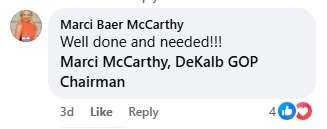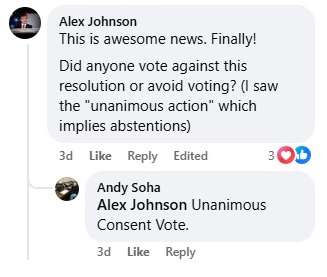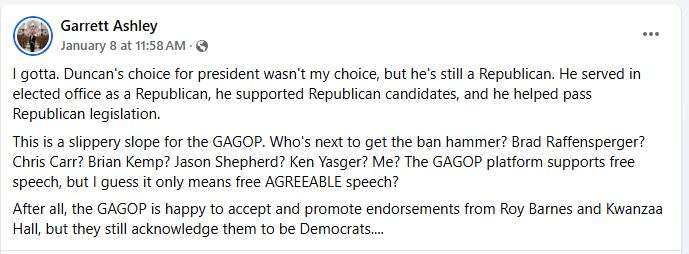
Decision to Remove Geoff Duncan: Due Process Matters
Let’s address the elephant in the room first (pun intended).
Geoff Duncan brought this on himself. You endorse Kamala Harris, and it’s safe to say you’re probably going to face some consequences from the Georgia Republican Party (GAGOP). That’s not exactly shocking. In fact, some form of accountability might even be warranted. Actions have consequences, and Duncan knew what he was getting into when he made that endorsement.
That said, let’s take a look at another example when removing someone from the party may have been warranted.
On Tuesday, November 29, 2016, I stood up at the Cobb County Republican Party County Committee meeting with a motion that would have started the process to remove former County Party Chairman Joe Dendy from the Party. I wasn’t looking for a complete expulsion, but simply that he be removed as immediate past chair, which would boot him from the County and Executive Committees.
Dendy had not endorsed a Democrat over a Republican as Geoff Duncan did…rather, he was on trial for multiple counts of child molestation. The debate made the Dec. 2, 2016 edition of the Marietta Daily Journal which reported, “FIREWORKS ERUPTED this week when the Cobb County Republican Committee argued over whether former county GOP chairman Joe Dendy should be booted from the organization.”
The MDJ continued, “Shepherd said there is a two-step process to remove anyone from membership. First, someone has to cite evidence of wrongdoing. Next, a committee must be formed to investigate the allegation. Shepherd was trying to create such a committee Tuesday.”
While it would seem like a “no-brainer”, my motion, which was to simply have everything prepped for a swift removal should, and only if, Dendy were to be found guilty (he eventually pled guilty and will likely spend the rest of his life in prison). It apparently was not.
The majority of the county committee disagreed preferring to wait until a guilty verdict to start a process that could take a couple of months to complete.
“When Shepherd called for a vote on forming the committee to be created Tuesday, Cobb GOP 1st Vice Chair Justin Tomczak made a motion to ‘lay it on the table,’ until the court rules on the matter. The Republican Committee adopted Tomczak’s motion and the meeting adjourned.”
The next March, in part because the Cobb GOP refused to deal with the Dendy issue, I was elected Chair of the Party. As such, Dendy was no longer immediate past chair and was removed.
As far as I know, no resolution has ever been adopted to expel Dendy from the GOP, ban him from calling himself a “Republican,” or prohibit him from attending party events should he ever get out of prison.
So, as he serves his time in prison, he can still call himself a “Republican.”
I bring up the above incident to note that, even if Dendy were to be convicted, as he eventually was, he deserved the due process afforded to members under our rules to have a formal hearing and decision made by the entire governing body of the Cobb GOP before he was removed from office.
The Rules of the Cobb County Republican Party (“Cobb Rules”) and The Rules of the Georgia Republican Party (“GAGOP Rules”) serve as the bylaws of each organization. Both sets of Rules also contain a supplemental set of rules incorporated into the organization’s bylaws, Robert’s Rules of Order, Newly Revised 12th Edition (“RONR 12th ed.” or “Robert’s Rules”).
This current edition of Robert’s Rules is 811 pages and contains 63 separate sections covering topics as mundane as making a motion to very specific due process procedures for disciplining a member. Rather than copying all 811 pages into the bylaws, the GAGOP Rules simply adds the book by stating, “Roberts Rules of Order, Newly Revised shall be followed in all meetings of the GRP, including , without limitation, the State Committee and State Executive Committee, the District Committees and District Executive Committees, and the County Committees and County Executive Committees, unless modified by, respectively, these Rules, applicable County Party rules, or applicable District Party rules; provided, however, that the provisions of Rule 9.12 shall govern all Precinct Caucuses, County Conventions, District Conventions, and the State Convention” (GAGOP Rules, pp. 39-40).
In the almost three decades that I have been involved in Republican politics, I have had the opportunity to draft or redraft the rules of various county parties and allied organizations. I have served as Chair of both the Cobb GOP and 11th Congressional District Rules Committees and as a member of the GAGOP Rules Committee. I have also served as parliamentarian for various organizations and have taught courses in Robert’s Rules since the 1990’s. While Robert’s Rules can be complicated and, at times, confusing, for 100+ years, it has provided guidance and, most importantly, protection for members of an organization.
When it comes to the conduct of members, Robert’s Rules makes one thing clear, “In most societies it is understood that members are required to be of honorable character and reputation, and certain types of associations may have particular codes of ethics to enforce” RONR (12th ed.) 61.1 <emphasis added>.
Robert’s Rules continues, “Although ordinary societies seldom have occasion to disciple members, an organization or assembly has the ultimate right to make and enforce its own rules, and to require that its members refrain from conduct injurious to the organization or its purposes. No one should be allowed to remain a member if his retention will do this kind of harm. Punishments that a society can impose generally fall under the headings of censure, fine (if authorized by the bylaws), suspension, or expulsion. The extreme penalty that an organization or society can impose on a member is expulsion” RONR (12th ed.) 61:1-61:2 <emphasis added>.
Both the Cobb Rules and GAGOP Rules contain provisions that call for the removal of anyone elected to any post within the Republican Party if that individual, “shall publicly advocate the election of another candidate for an office for which the Republican Party has nominated a candidate” (GAGOP Rules, p. 16).
The Rule stipulates a cause for removal, but not a separate procedure from the one found in Robert’s Rules. What’s more, the GAGOP Rule is only applicable to “a member of the State Committee, a District Committee, or a County Committee” (GAGOP Rules, p. 16). The Rules have no provisions concerning the conduct of those who would simply be “party members”, so we would have to turn to Robert’s Rules for guidance.
“If improper conduct by a member of a society occurs elsewhere that at a meeting, the members generally have no first-hand knowledge of the case. Therefore, if disciplinary action is to be taken, charges must be preferred and a formal trial held before the assembly of the society, or before a committee – standing or special – which is required to report its findings and recommendations to the assembly for action” RONR (12th ed.) 61:22 <emphasis added>.
Recently, the GAGOP did hold a formal trial to remove 1st Vice-Chair Brian K. Pritchard from his position after he was found by an administrative law judge to have committed multiple counts of voter fraud more than a decade ago. While Pritchard was removed from his position, he has not been expelled from the party, banned from calling himself a “Republican”, or prohibited from attending party events.
This all brings us to the Resolution recently passed by the Executive Committee of the Georgia Republican Party expelling former Lt. Governor Geoff Duncan from the Republican Party (the Duncan Resolution). While Scot Turner has already mostly discussed the political implications on Peach Pundit the Podcast, which we both agree on, he has brought up the question of the legality of the Duncan Resolution, especially as it pertains to its enforceability.
Resolutions have a binding effect on an organization. Once passed, unless it has an expiration date or is repealed or replaced by a new resolution, it remains in effect, indefinitely. The best way to think of a resolution versus the Rules is the Rules are like the Constitution while the Resolution is more like a law passed by Congress. The Resolution cannot contradict the Rules, but it also does not require the same process that amending the Rules does, just as it is more difficult to amend the Constitution than it is for Congress to pass a law, it is more difficult to amend the Rules than to pass a resolution.
Here, the Duncan Resolution, as a disciplinary resolution, would be governed under §63 “Investigation and Trial” of Robert’s Rules. As such, even though we all did, in fact, see and hear Duncan’s support of first Biden and then Harris, he is still afforded all of his due process rights. Anything less is simply a form of “lawfare.”
As such, the Resolution passed by the Executive Committee gives no indication that a confidential investigation by any committee was held (63:8), proper notice was given to Duncan (63:28), a trial conducted (63:30), and opportunity for Duncan to speak in or have a representative speak in his defense (63:33). The members of the GAGOP Executive Committee who have spoken to Peach Pundit on the condition of anonymity have informed us that the Resolution was voted on via email with NO formal discussion whatsoever.
As such, as the Resolution was not passed as required by Robert’s Rules, it is void on its face and mostly unenforceable.
I say mostly, because it does not require a resolution for notice that an individual is not welcome at the events of an organization. A simple letter would have been sufficient notice. In Georgia, a person can be charged with criminal trespass for attending even public events if the organizer has informed them that their attendance is not welcome.
As Republicans, we pride ourselves on due process, fairness, and following the rules. Among the reasons we here at Peach Pundit find the resolution concerning isn’t just the consequence Duncan faced — it’s how they went about it and the shaky reasons they cited to justify it.
The GAGOP Resolution: Fact vs. Fiction
The resolution contains some troubling — and frankly, false — allegations that need to be addressed.
1. Duncan Never Implied a Donald Trump Endorsement
One of the GAGOP’s claims is that Duncan implied he had Trump’s endorsement during his campaigns. There’s absolutely no evidence to back this up. This allegation seems more like David Shafer taking a shot at the guy who beat him in an election rather than a fact-based claim.
2. Duncan Never Claimed to Have Graduated from Georgia Tech
Another bizarre allegation in the resolution is that Duncan implied he graduated from Georgia Tech. This simply isn’t true. Duncan has been open about his educational background and even gave a speech addressing this topic. You can watch it here.
Why make a false claim when it’s so easily debunked?
3. Insider Allegations That Can’t Be Proven
The rest of the resolution reads like insider baseball — a series of claims that can neither be proven nor disproven with publicly available information. It’s essentially a fan-service document for those already convinced Duncan is the enemy.
One prominent GAGOP activist even commented on the resolution, saying: “The only good thing this resolution did was give David Shafer a good laugh for about 30 minutes.”
As for the rest of the Resolution, let’s look at each one of its unenforceable provisions. My commentary is in italics following the provision:
NOW, THEREFORE, BE IT RESOLVED, by the State Executive Committee of the Georgia Republican Party: There is some discussion that the Executive Committee does not even have the authority to pass an expulsion resolution. While GAGOP Rules allow the Executive Committee the authority to govern party affairs between meetings of much larger governing State Committee, having served for more than a decade on the Executive Committee and State Committee, that rule is purposed to make sure that ordinary business can be conducted without having to always call the State Committee to order. If the GAGOP Rules require a meeting of the State Committee to remove an officer, it doesn’t make any sense for a smaller, more insular body to be able to remove a member who has less power within the body than an elected officer. Consequently, if the Executive Committee does, indeed, have the power to expel, then why did they not act in such a swift manner to expel Brian Pritchard? As Robert’s Rules are designed to protect and provide due process for members, then prudence would dictate that the Executive Committee acted outside its authority and therefore, the Resolution is invalid and void.
1. That the open letter from Josh McKoon, Chairman of the Georgia Republican Party, to Geoff Duncan dated August 2, 2024, is hereby ratified, confirmed, and approved. Nothing wrong with rubberstamping the action of the Chairman, but once again, it doesn’t have any real, binding effect on Duncan. Duncan could have just as easily sent McKoon a similar letter. Both would have looked at it with contempt and laughed.
2. That Geoff Duncan is hereby expelled from the Georgia Republican Party. The key point of Resolution and it is unenforceable because McKoon and Shafer would rather score political points. This provision does not follow §63 of Robert’s Rules and, as such, cannot expel Duncan from the Georgia Republican Party. I have seen some questions as to if he is even a member (as an organization can only expel members). I believe Rule 1.1 of the GAGOP Rules allow for the GAGOP to consider him a “member” for this purpose. Rule 1.1 states, “All electors who are in accord with the principles of the Republican Party, believe in its declaration of policy and are in agreement with its aims and purposes may participate as members of the Georgia Republican Party, Inc. (hereinafter “GRP”) in its conventions or precinct caucuses.” As membership includes “all electors”, assuming Duncan believes he is in “accord with the principles of the Republican Party (note it doesn’t say the GEORGIA Republican Party)”, then he is a “member”.
3. That Geoff Duncan is hereby banned from qualifying as a candidate of the Georgia Republican Party. This has been part of the debate in Catoosa County…can a party ban a candidate from qualifying? In my previous post, “The Curious Case of Alex Johnson”, I discuss “Hero v. Lake County Election Board,” a case out of Indiana where Joseph Hero, who was suspended from the Republican Party for 10 years, was not allowed to qualify for public office as a Republican. You can read the post for the specifics, but it boils down to the fact that Georgia and Indiana laws on candidate qualifying are very different and the parties are given greater power under the law in Indiana than they are in Georgia. But, even if it could be valid, contacts and many laws have what are called “severability” clauses that state if one party of the contract or law is invalidated, the rest remains. The reason is that if part of the law or contract is struck down, without this clause that states if one part is found to be invalid, the rest remains, then courts look at contracts and laws as a whole, so if one part is invalid, the whole thing is. McKoon knows this, but didn’t put it in and, as resolutions are a form of law, this is null and void.
4. That the nomination of Geoff Duncan as the Republican candidate for Lieutenant Governor is hereby expunged. I don’t even know where to begin on this. It’s so outrageously stupid as to defy logic. Does the Executive Committee think they have the power and authority to declare void thousands of Republican votes? Do they want the history books re-written to remove the nomination? Isn’t that what the USSR Central Committee liked to do…erase individuals from photos and the history books? I award the Georgia Republican Party no points and may God have mercy on their souls.
5. That nominations of Geoff Duncan as a Republican candidate for the Georgia House of Representatives are hereby expunged. Just see above. SMH
6. That Geoff Duncan is hereby demanded to cease calling himself a “Republican” or using his false claim of being a “Republican” for personal profit. So, can he refer to himself as a “Republican” for non-profit reasons? “I’m Republican Geoff Duncan and I’m here to ask for your support for the ASPCA…” as Sarah McLachlan plays in the background? On a serious note, there is an obvious 1st Amendment issue here. While the Republican Party as an organization has freedom of association, so does Duncan and the Constitution protects individuals above organizations. Also, even though the GAGOP is the official organ of the Republican Party in this state, it is questionable that it can expel an individual from the Party as a whole. The RNC does not delegate membership to individual voters like the GAGOP does. Here is another issue of the GAGOP lacking authority to do something even if the resolution itself was not otherwise void.
7. That Geoff Duncan is hereby banned from all property owned or leased by the Georgia Republican Party and all events held by or under the authority of the Georgia Republican Party. Yeah, they can do that, but they don’t need a resolution for notice. It is questionable that Duncan has notice since the Resolution is void. There is also a caveat and that comes with voting rights attached. It has long been held that the Party’s Precinct Caucuses are governed under state election laws. When counties try to charge a fee for attending precinct caucuses, they are told charging a fee is legally the equivalent of charging a poll tax. As the Party cannot prohibit an individual from voting in party operations governed by election laws, then Duncan likely cannot be barred from his precinct caucus. That also calls into question what should happen if Duncan’s precinct elects him a delegate to the county convention? That’s governed by the GAGOP Rules and the Call of the Convention, both of which are higher authorities than a resolution, especially one that is void. Of course, this is all academic as Duncan would likely not participate in such functions anyway.
8. That the Executive Director of the Georgia Republican is hereby directed to furnish Geoff Duncan with a copy of this Resolution and notice of Item 5 above pursuant to O.C.G.A. 16-7-21. Typo. It should say “item 7” as the referenced law deals with criminal trespass. Once again, just goes to highlight the shoddy manner in which this resolution was put together and adopted.
Of course, the media advisory sent out by the GAGOP, the party also demanded that the media reference Duncan “as ‘expelled Republican Geoff Duncan’ or ‘ousted Republican Geoff Duncan’ when you go to him for quotes trashing President Trump and the Republican Party.”
For our friends on the opposite side of the aisle, before you laugh and point fingers, your side has a similar history in removing those who do not tow the party line. In 2017, the Athens-Clarke County Democratic Party voted to oust Mayor Nancy Denson, a long time member, from the party because she openly supported her former campaign manager, Republican Houston Gaines, in a very red district that included Athens.
In 2014, the Chattooga County Democratic Party voted to ban Democratic Sole Commissioner Jason Winters from running for re-election as a Democrat after he openly supported Republicans Gov. Nathan Deal and State Senator Jeff Mullis in the 2014 mid-term elections. While the ban was never tested for its legality as Winters simply switched parties and qualified as a Republican, the fact that the Republicans seem to be racing to adopt the authoritarianism of the Democrats on this issue only serves to give credence to the idea that there really is such a thing as a “UniParty”.
Of course, as news of the Duncan Resolution reached the party faithful, it was mostly met with widespread praise. Looking so much as a bully in a bad comedy spouting bad clichés, Justin Rice, the Executive Director of the GAGOP warns Duncan to, “Be governed accordingly.”
I’m sure Geoff Duncan was curled up in the fetal position over that warning.
DeKalb GOP Chair Marcy McCarthy commented on Facebook:

No surprise, but GRA President Alex Johnson was just as enthusiastic as was Andy Soha who, backed by the GRA, ran a primary challenge to Sen. Kay Kirkpatrick in the 2022 election:

There were other state and local party leaders and activists who lauded the meaningless move with only a handful, like former Clayton County GOP Chair Garrett Ashley who was willing to call out the resolution on social media.

Ashely’s post included a draft to a resolution he plans to present.
As for the Duncan Resolution, as those who passed it knew or should have known it was not incompliance with the Rules, what purpose did it have? Was it simply David Shafer who is still in shock he lost the 2018 runoff to Duncan trying to get one more pound of flesh from a political rival? Or was it simply because it was January 6 and January 6 seems to have become “Republicans Do Stupid Things” Day?
If action was to be taken, and I don’t know that it needed to be as victory is the best revenge, at least it should have been taken with an eye towards a legitimate process, a narrow focus, and enforceable consequences.
The Duncan Resolution fails on each one of those counts.
Instead, the fools that wrote it will ensure, that for all its sound and fury, it signifies nothing.
